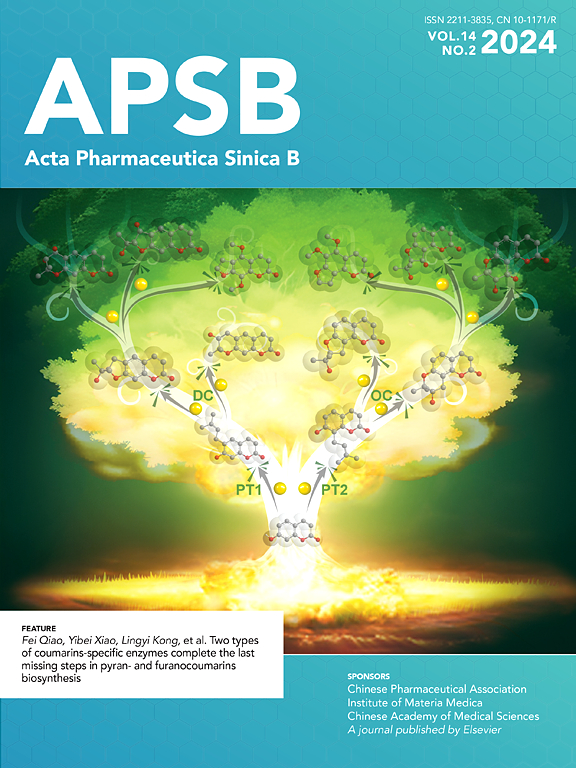Targeted inhibition of Gus-expressing Enterococcus faecalis to promote intestinal stem cell and epithelial renovation contributes to the relief of irinotecan chemotoxicity by dehydrodiisoeugenol
IF 14.7
1区 医学
Q1 PHARMACOLOGY & PHARMACY
引用次数: 0
Abstract
Irinotecan (CPT11) chemotherapy-induced diarrhea affects a substantial cancer population due to β-glucuronidase (Gus) converting 10-O-glucuronyl-7-ethyl-10-hydroxycamptothecin (SN38G) to toxic 7-ethyl-10-hydroxycamptothecin (SN38). Existing interventions primarily address inflammation and Gus enzyme inhibition, neglecting epithelial repair and Gus-expressing bacteria. Herein, we discovered that dehydrodiisoeugenol (DDIE), isolated from nutmeg, alleviates CPT11-induced intestinal mucositis alongside a synergistic antitumor effect with CPT11 by improving weight loss, colon shortening, epithelial barrier dysfunction, goblet cells and intestinal stem cells (ISCs) loss, and wound-healing. The anti-mucositis effect of DDIE is gut microbiota-dependent. Analysis of microbiome profiling data from clinical patients and CPT11-induced mucositis mice reveals a strong correlation between CPT11 chemotoxicity and Gus-expressing bacteria, particularly Enterococcus faecalis (E. faecalis). DDIE counters CPT11-induced augmentation of E. faecalis, leading to decreased intestinal Gus and SN38 levels. The Partial Least Squares Path Model (PLS-PM) algorithm initially links E. faecalis to dysregulated epithelial renovation. This is further validated in a 3D intestinal organoid model, in which both SN38 and E. faecalis hinder the formation and differentiation of organoids. Interestingly, colonization of E. faecalis exacerbates CPT11-induced mucositis and disturbs epithelial differentiation. Our study unveils a microbiota-driven, epithelial reconstruction-mediated action of DDIE against mucositis, proposing the ‘Gus bacteria–host–irinotecan axis’ as a promising target for mitigating CPT11 chemotoxicity.

脱氢二异丁香酚靶向抑制表达gus的粪肠球菌促进肠道干细胞和上皮细胞的修复,有助于减轻伊立替康的化学毒性。
伊立替康(CPT11)化疗引起的腹泻影响着大量癌症患者,这是由于β-葡萄糖醛酸酶(Gus)将10-O-葡萄糖醛酸-7-乙基-10-羟基喜树碱(SN38G)转化为有毒的7-乙基-10-羟基喜树碱(SN38)所致。现有的干预措施主要针对炎症和Gus酶抑制,忽视了上皮修复和Gus表达细菌。在这里,我们发现从肉豆蔻中分离出的脱氢二异丁子香酚(DDIE)能减轻CPT11诱导的肠粘膜炎,同时还能与CPT11协同抗肿瘤,改善体重下降、结肠缩短、上皮屏障功能障碍、鹅口疮细胞和肠干细胞(ISCs)损失以及伤口愈合。DDIE 的抗黏膜炎作用依赖于肠道微生物群。对临床患者和CPT11诱导的粘膜炎小鼠的微生物组图谱数据分析显示,CPT11化学毒性与Gus表达细菌,尤其是粪肠球菌(E. faecalis)之间存在很强的相关性。DDIE 抵消了 CPT11 诱导的粪肠球菌增殖,导致肠道 Gus 和 SN38 水平下降。偏最小二乘法路径模型(PLS-PM)算法最初将粪大肠杆菌与失调的上皮细胞更新联系起来。这一点在三维肠道类器官模型中得到了进一步验证,在该模型中,SN38 和粪大肠杆菌都阻碍了类器官的形成和分化。有趣的是,粪大肠杆菌的定植会加剧 CPT11 诱导的粘膜炎并干扰上皮分化。我们的研究揭示了微生物群驱动、上皮重建介导的 DDIE 抗粘膜炎作用,提出 "Gus 细菌-宿主-伊立替康轴 "是减轻 CPT11 化学毒性的一个有希望的靶点。
本文章由计算机程序翻译,如有差异,请以英文原文为准。
求助全文
约1分钟内获得全文
求助全文
来源期刊

Acta Pharmaceutica Sinica. B
Pharmacology, Toxicology and Pharmaceutics-General Pharmacology, Toxicology and Pharmaceutics
CiteScore
22.40
自引率
5.50%
发文量
1051
审稿时长
19 weeks
期刊介绍:
The Journal of the Institute of Materia Medica, Chinese Academy of Medical Sciences, and the Chinese Pharmaceutical Association oversees the peer review process for Acta Pharmaceutica Sinica. B (APSB).
Published monthly in English, APSB is dedicated to disseminating significant original research articles, rapid communications, and high-quality reviews that highlight recent advances across various pharmaceutical sciences domains. These encompass pharmacology, pharmaceutics, medicinal chemistry, natural products, pharmacognosy, pharmaceutical analysis, and pharmacokinetics.
A part of the Acta Pharmaceutica Sinica series, established in 1953 and indexed in prominent databases like Chemical Abstracts, Index Medicus, SciFinder Scholar, Biological Abstracts, International Pharmaceutical Abstracts, Cambridge Scientific Abstracts, and Current Bibliography on Science and Technology, APSB is sponsored by the Institute of Materia Medica, Chinese Academy of Medical Sciences, and the Chinese Pharmaceutical Association. Its production and hosting are facilitated by Elsevier B.V. This collaborative effort ensures APSB's commitment to delivering valuable contributions to the pharmaceutical sciences community.
文献相关原料
公司名称
产品信息
上海源叶
4-methylumbellifery-β-d-glucuronide
 求助内容:
求助内容: 应助结果提醒方式:
应助结果提醒方式:


